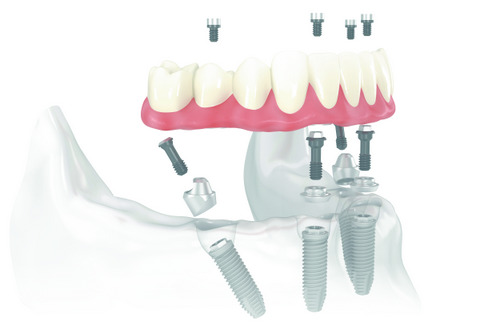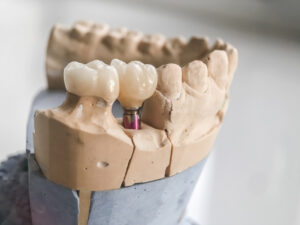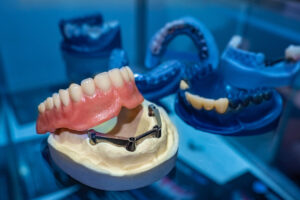Approximately 57% of seniors in the United States wear some type of dental prosthesis such as a partial denture (“flipper”) or complete denture. For many, tooth loss is just another part of the aging process. But, it doesn’t have to be. With dental implant-supported prostheses, such as the All-on-4® treatment concept, you don’t have to settle for poor-fitting, uncomfortable dentures – you have options!
Once you have met with the skilled staff of Susquehanna Oral & Facial Surgery & Dental Implant Center and together we have decided you are an ideal candidate for the All-on-4 procedure, we will discuss the risks involved as well as your personal care requirements. We will do everything we can to ensure a successful All-on-4 procedure, but it’s up to you to perform at-home care and attend regular checkups. The good news is this procedure – along with other types of dental implants – has a high success rate and complications are relatively rare.
Read on to learn about what all goes into ensuring a successful All-on-4 procedure.
What are All-on-4 Implants?
All-on-4 implant procedures are designed to replace a full arch, or “row,” of teeth. One of the great things about this procedure is that you can have a completely new smile in just one day! Also, the dental bridge can be secured in place with as few as four dental implants.
All-on-4 procedures come at a higher cost than traditional dentures, although this type of procedure is more economical than placing an implant and crown for each individual tooth. The good news is that we offer financing through Care Credit and Sunbit, which can help ease the financial burden of dental implant procedures.
Factors to Improve All-on-4 Procedures
Apart from choosing an experienced All-on-4 provider such as Susquehanna Oral & Facial Surgery & Dental Implant Center, there are a number of factors that will influence the long-term success of your All-on-4 procedure. These include:
- Healthy jawbone. Since your dental implants will be anchored into your jawbone, sufficient bone volume and density are required to ensure long-lasting success. Fortunately, if your jawbone does not currently meet care requirements, you do have several options. Zygomatic implants are placed into the zygomatic bone (cheekbone) to ensure stability. Bone grafting and/or soft tissue grafting can also be used to increase the quality of available tissue.
- Healthy gum tissue. Ideally, your gum tissue should be free of gingivitis/gum disease before undergoing dental implant procedures. When gums are healthy they form what is known as a “mucosal seal.” This seal assists in preventing bacterial intrusion around the dental implant posts and abutments. Peri-implantitis, an infection around the implant post, is the leading cause of dental implant failure. Therefore, maintaining healthy gum tissue is essential.
- Self-care. Dental implants and prostheses may not be susceptible to cavities and decay like natural teeth, but gum and bone tissue can still become infected. You should care for your dental implants and implant bridge as you would your natural teeth. This means twice-daily brushing and the use of specialized floss to clean under the implant bridge and around the implants.
Is All-on-4 Right for Me?
The All-on-4 treatment concept is designed for patients missing all or most of their teeth in an arch. Patients who typically choose All-on-4 are looking to avoid conventional dentures, but there are a number of benefits as well. This type of treatment is a popular option for those looking to improve the appearance of their smile, the function of their bite, and the clarity of their speech.
All-on-4 Post-Operative Instructions
Long-term success with all-on-4 requires diligent self-care. If you ever have difficulty understanding or performing the All-on-4 post-operative instructions provided to you, please reach out to our office.
Since every procedure is unique, so too will the aftercare instructions provided by your dentist be tailored to your treatment plan. Therefore, the aftercare instructions provided on this page will most likely differ from those provided to you.
- Managing pain and swelling. Depending on your particular case, the dentist may prescribe you antibiotics and pain medicine. These should be used as directed. To help with the pain, you can apply an ice pack on your outer cheek, 10 to 20 minutes per area. You may also take over-the-counter medications such as Ibuprofen, Advil, or Motrin. If you are using a prescribed pain medication, avoid any over-the-counter pain medication that contains acetaminophen. Any lingering pain should subside five days following surgery.
- Things to avoid. Certain activities can disrupt the healing process. You should not smoke, vape, use a straw when drinking, or spit for the 5 days following surgery. You should also avoid touching the surgical sites.
- Stick to soft foods. The dentist will recommend a diet of soft foods for a set duration following surgery, typically around three months. Do not eat hard foods as this can lead to complications. Popular soft food options include apple sauce, canned seedless fruits, mashed potatoes, well-cooked vegetables, stewed or roasted chicken, soups, protein shakes, and soft breads. Smoothies and ice cream are particularly popular the days following surgery as the coolness helps with swelling and pain relief.
- Brushing and flossing. The day following your surgery (unless otherwise indicated by your dentist) you can resume normal brushing and flossing. The dentist will most likely prescribe a medicated rinse to be used for the week following your procedure. A water flosser (water pik) will also be useful in keeping the areas around your implants hygienic.
- Physical activities and exercises. Right after surgery, your dental implants are held in place by mechanical friction. This will change once bone tissue begins to grow around the implant post and threads. Therefore, you should avoid rigorous physical activities and exercises for the five days following your surgery.




